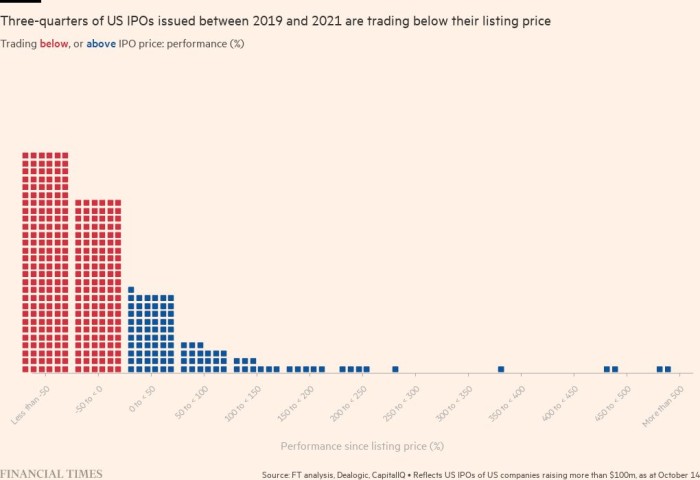Private equity circles fallen stars of pandemic IPO boom
Three-quarters of large US companies that went public during the pandemic bull market are trading below their offering price, forcing some once-promising names back into private hands at fire-sale valuations.
Of more than 400 listings where companies raised at least $100mn between 2019 and 2021, 76 per cent are below the price at their initial public offering, a Financial Times analysis of Dealogic data shows. The group’s median return since their respective IPO dates is negative 44 per cent.
The laggards include such-hyped stocks as Robinhood Markets, Lyft and DoorDash, all of which went public during a market boom that ended in late 2021. The Nasdaq Composite index that contains many growth companies has fallen 32 per cent this year.

ForgeRock, a business software company, last week announced it would retreat to the obscurity of private markets just over a year after its September 2021 IPO, agreeing to sell itself to the private equity firm Thoma Bravo for $2.3bn.
It was a bitter pill. ForgeRock’s stock price almost doubled after its New York listing, giving it a market capitalisation of about $4bn. Chief executive Francis Rosch said that merely being publicly traded added cachet and ultimately shareholder value.
“[T]he market awareness of ForgeRock is growing . . . and I think certainly . . . the IPO is going to help in that as well,” the CEO told investors last November.
Yet with the 2022 rout in growth stocks, ForgeRock’s share price fell as much as 50 per cent below its listing price. Even with the 53 per cent premium that Thoma Bravo has agreed to pay, the takeover price is almost a tenth below ForgeRock’s IPO price.
This story originally appeared on: Financial Times - Author:Nicholas Megaw
















